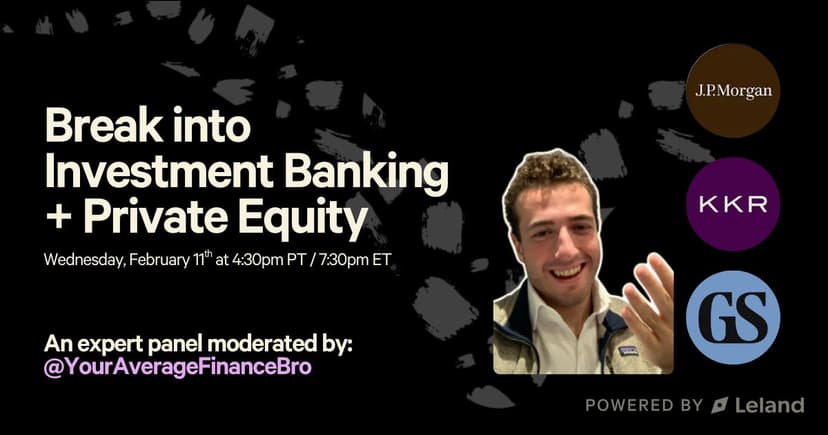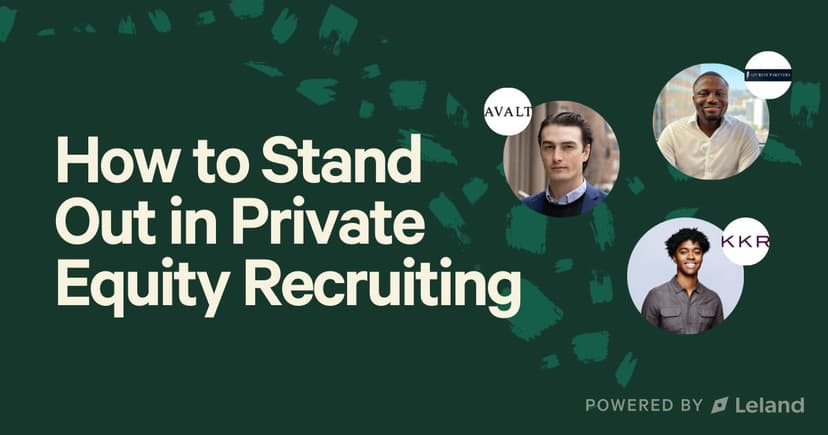Intro to Real Estate Private Equity and Headwinds
Private Equity Interviews: The Ultimate Guide (2026)
Looking to land your dream job in private equity? This article provides expert tips and insights on how to prepare for and succeed in your next interview.
Posted January 14, 2026

Join a free event
Learn from top coaches and industry experts in live, interactive sessions you can join for free.
Table of Contents
Private equity is all about investing in private companies to increase their value and achieve high returns. Private equity firms often take a hands-on approach, working with portfolio companies to improve operations, boost revenue growth, and maximize profits. These firms commonly use strategies like growth equity, leveraged buyouts, and restructuring distressed businesses.
If you’re looking to break into the private equity industry, it’s essential to understand the fundamentals, everything from capital structure and enterprise value to analyzing free cash flow and operational improvements. This foundational knowledge is not only critical for your role but also for answering private equity interview questions.
Read: The 50 Most Common Private Equity Interview Questions
How to Prepare for a Private Equity Interview
Preparing for a private equity interview requires a combination of thorough research, technical expertise, and strategic communication. These interviews are designed to test both your knowledge of the private equity industry and your fit within a specific firm’s culture. By following a step-by-step approach, you can present yourself as a well-rounded, highly capable candidate who’s ready to excel in the role. Below are actionable tips and examples to help you prepare effectively.
1. Do Your Homework on the Firm
Researching the firm is the foundation of your preparation. Familiarize yourself with its portfolio companies, investment strategy, and industry focus. Dig into the firm’s history, recent deals, and any newsworthy events. Look for details about how the firm approaches operational improvements, revenue growth, or strategic buyouts. For example, if the firm recently invested in a technology startup to scale its operations, understand the rationale behind the investment and its expected impact.
Example: If you’re interviewing with a middle-market fund specializing in healthcare, you might say: "I noticed your firm recently acquired a chain of outpatient surgical centers. I’m impressed by the focus on improving operational efficiencies while expanding patient outreach. My experience in financial modeling for healthcare companies aligns well with this strategy, as I’ve worked on projects that analyzed similar growth opportunities."
Aligning your responses to the firm’s values shows you’re not just interested in private equity—you’re interested in their private equity firm.
2. Get Ready for a Multi-Step Interview Process
Private equity interviews often have multiple rounds, each focusing on different aspects of your skills and personality. Expect technical questions about financial modeling, behavioral interviews assessing teamwork and leadership, and firm-specific fit questions. The process may include:
- Technical Rounds: Questions about cash flows, enterprise value, or a leveraged buyout (LBO) scenario.
- Behavioral Rounds: Situational questions like, “Tell me about a time you worked under pressure on a team project.”
- Fit Rounds: Conversations about how your investment style or values align with the firm’s philosophy.
Example: During the technical round, you may be asked to explain how a company’s capital structure affects its valuation. A strong response could include breaking down how debt and equity interact, using a real-world example if applicable.
Preparing for each stage by reviewing firm-specific details and practicing relevant skills ensures you’ll approach the process with confidence.
3. Practice Common Private Equity Interview Questions
Certain questions are almost guaranteed to come up in private equity interviews. Being prepared with thoughtful, specific answers can set you apart.
- “Why private equity?”
This question assesses your motivation for pursuing the role. A strong answer might highlight your interest in driving value creation through strategic investments and operational improvements.
Example: "I’m passionate about working in private equity because it combines strategic decision-making with tangible outcomes. During my time as a private equity analyst, I found the most rewarding part of my job was supporting M&A deals that directly impacted a company’s growth trajectory. I want to take that experience further by being part of a team that not only identifies opportunities but also drives their execution."
- “How does your experience align with our firm’s goals?”
This question evaluates your fit for the firm. Tailor your answer to the firm’s industry focus and recent deals.
Example: "I understand that your firm prioritizes investments in renewable energy. During my last role, I worked on a financial model for a solar energy startup seeking Series B funding. That experience gave me deep insights into renewable energy trends, and I’m excited to bring that knowledge to your team."
- Technical Questions
Be prepared to discuss EBITDA growth, free cash flows, or the nuances of financial modeling. For example, you might be asked to calculate enterprise value or evaluate a dividend recapitalization scenario. Practice these types of questions beforehand to ensure you can answer confidently under pressure.
Example Technical Question:
"Walk me through the steps to build an LBO model
Response: "First, I’d calculate the purchase price, including equity and debt financing. Next, I’d project cash flows over the investment horizon, factoring in revenue growth, operating margins, and capital expenditures. Then, I’d model debt repayment schedules and exit assumptions to calculate the internal rate of return (IRR). Finally, I’d stress-test the model for sensitivity to changes in key inputs like EBITDA growth or interest expense."
Skills You Need to Shine in a Private Equity Interview
Excelling in a private equity interview requires a mix of technical expertise, leadership abilities, and strategic thinking. These skills are critical to demonstrating your readiness to contribute meaningfully to a private equity fund and thrive in the demanding environment of PE firms. Below, we explore the key skills you need to develop and showcase during the private equity recruiting process.
Show off your technical expertise
Technical skills are a cornerstone of success in private equity interviews. Firms expect candidates to have a solid grasp of financial modeling, analyzing financial statements, and working with balance sheets. You should be well-versed in leveraged buyout models (LBOs), free cash flow analysis, and understanding intangible assets, as these concepts are frequently tested during technical rounds.
It’s also important to understand how private equity funds structure their investments, including debt financing and equity allocation. Be ready to discuss how various components of a company’s capital structure—such as enterprise value or interest expense—affect its valuation and the feasibility of an investment.
Preparation is key. Practice building financial models and interpreting financial statements so you can confidently handle questions that assess your technical knowledge. Remember, PE firms want candidates who can quickly evaluate complex financial scenarios and identify opportunities for operational improvements.
Prove you’re a team player and leader
Private equity professionals frequently collaborate in small, tight-knit teams, making teamwork and leadership critical. During the private equity recruiting process, firms look for individuals who can seamlessly work with others while demonstrating the ability to take initiative when needed.
Highlighting your leadership skills is essential. Whether you’ve managed a team on a challenging project or contributed significantly to a group’s success, be ready to showcase examples that reflect your ability to lead effectively. Equally important is your ability to collaborate. Firms value individuals who can navigate team dynamics, contribute to decision-making processes, and support colleagues in achieving shared goals.
PE firms are particularly drawn to candidates who can balance individual expertise with a team-oriented mindset. Demonstrating that you can thrive in both roles will help set you apart as a well-rounded candidate.
Demonstrate strategic thinking
Strategic thinking is at the heart of private equity. Firms seek candidates who can analyze potential investments with a critical eye and contribute to the overall growth of a private equity fund.
In your interview, emphasize your ability to evaluate a company’s business model, identify growth opportunities, and recommend operational improvements. PE firms value candidates who can think beyond the numbers and propose actionable strategies that align with the firm’s objectives.
Understanding broader trends in the private equity industry is equally important. Discuss how you keep up with market developments and how these trends could influence a firm’s investment strategy or its portfolio companies. For example, you might address how economic conditions affect revenue growth projections or the feasibility of leveraging debt financing in an LBO model.
Strategic thinking also involves aligning your skills with the specific priorities of the PE firm. Research the firm’s past investments, industry focus, and approach to managing portfolio companies. Show how your insights can contribute to their success, whether by improving cash flows, optimizing capital structure, or identifying acquisition targets that complement their existing portfolio.
Stand out during the private equity recruiting process
To shine during the private equity recruiting process, you need to combine technical expertise, leadership, and strategic thinking into a cohesive narrative. PE firms assess candidates holistically, so be sure to demonstrate your readiness to navigate complex financial scenarios, collaborate effectively within teams, and contribute to the success of the firm and its portfolio companies. By mastering these skills and tailoring your preparation to the firm’s values and objectives, you’ll position yourself as a top candidate in this competitive field.
How to Handle Behavioral and Technical Questions
Preparing for both behavioral and technical questions is essential to excelling in the private equity interview process. Firms use these questions to evaluate not only your technical expertise but also your ability to navigate challenges, work with others, and align with the culture of a particular firm. Here’s how to approach these questions effectively.
Be ready for behavioral questions
Behavioral questions focus on assessing how you handle real-world scenarios, manage pressure, and contribute to a team. Common questions include:
- “Tell me about a time you managed a deal under tight deadlines.”
- “Describe how you led a team to achieve a challenging goal.”
These questions often require candidates to draw from their experience, whether in previous roles, internships, or investment banking interviews. Use the STAR method (Situation, Task, Action, Result) to structure your answers, ensuring you provide a clear and compelling narrative.
When answering behavioral questions, emphasize your alignment with the firm’s values and priorities. For example, discuss how you resolved conflicts in a team setting, prioritized tasks during a high-pressure situation, or demonstrated leadership when collaborating with a management team on a complex project. Highlighting these qualities shows that you can thrive in the demanding environment of private equity.
Tackle technical and transaction questions with confidence
Technical questions are designed to test your financial knowledge and analytical skills. Private equity firms often draw on scenarios that involve:
- Be prepared to explain the steps, from calculating the purchase price to forecasting cash flows and determining the internal rate of return (IRR).
- Discuss how debt and equity interact and how they impact enterprise value.
- Understand when and why a firm might use this strategy.
These questions may also extend to industry-specific considerations, such as evaluating the financials of portfolio companies or proposing strategies for operational improvements. Preparation is key—practice these concepts thoroughly, as they are central to both private equity and investment banking interviews.
Confidence is just as important as accuracy. If you encounter a question you can’t answer, admit it honestly, but outline how you would approach solving the problem. This demonstrates your critical thinking skills and your ability to remain composed under pressure.
How to stand out in a multi-stage interview
Private equity interviews typically involve multiple rounds, with interviewers assessing various aspects of your qualifications. Each round may focus on a specific area, such as technical knowledge, cultural fit, or strategic thinking. Here’s how to excel:
- Tailor your responses. Adapt your answers to align with the priorities of each interviewer. For example, when speaking with a member of the management team, focus on your leadership and decision-making skills. With a technical interviewer, emphasize your financial modeling experience and knowledge of capital structure.
- Build rapport. Engage with each interviewer personally and professionally. Show genuine interest in the firm’s goals and values, and ask thoughtful questions about their portfolio companies or investment strategies.
- Demonstrate cultural fit. Private equity firms value candidates who align with their culture. Research the particular firm’s mission and recent deals, and incorporate this knowledge into your responses to show that you understand their objectives.
By preparing for each stage of the interview process and tailoring your approach to the needs of the interviewers, you’ll showcase your ability to contribute meaningfully to the firm and its investment team.
Why a Follow-Up Matters
Following up after a private equity interview is a critical step that many candidates overlook, yet it can significantly impact the hiring decision. A thoughtful thank-you email to your interviewers demonstrates not only professionalism but also your genuine interest in the private equity associate or analyst role. Beyond expressing gratitude, this communication provides an opportunity to reinforce key points discussed during the interview and to highlight your alignment with the firm’s values and goals.
In your follow-up, consider referencing specific aspects of the discussion that resonated with you or tied directly to your qualifications. For instance, if you discussed a recent investment that focused on maximizing equity value, you can mention how that aligns with your experience in financial modeling and evaluating capital structures. Similarly, if the interview touched on the firm’s culture or unique approach to portfolio management, reiterating your enthusiasm for those aspects shows your strong firm knowledge and commitment to contributing meaningfully.
A follow-up email also allows you to address any areas where you feel your responses could have been clearer or more detailed. For example, if a technical question about enterprise value or deal structuring felt incomplete, use this as a chance to provide a more comprehensive response or clarify your thought process. This demonstrates not only your dedication to accuracy but also your ability to reflect and improve, qualities highly valued in private equity associates.
By taking the time to craft a personalized, professional follow-up email, you make a lasting impression on your interviewers. It reinforces your attention to detail, strengthens your connection to the firm, and positions you as a candidate who is genuinely invested in the opportunity. This small but powerful step can make all the difference in a competitive private equity recruiting process.
The Value of Top Private Equity Coaches
Private equity interviews are known for their complexity, requiring candidates to balance technical expertise, strategic thinking, and a strong cultural fit with the firm. While these interviews offer an exciting chance to join one of the most dynamic industries in finance, the process can be overwhelming without proper preparation.
A top private equity coach can make a significant difference in helping candidates succeed. These professionals provide tailored guidance on every aspect of the private equity recruiting process, from mastering technical concepts like equity value and LBO modeling to refining firm knowledge and crafting strong answers to behavioral questions. Coaches also focus on aligning a candidate’s preparation with the specific requirements of the firms they are targeting, ensuring they stand out during interviews.
Want to get expert Guidance?
By working with a coach, candidates gain confidence and clarity, equipping them to navigate each stage of the interview process effectively. With expert insights and personalized support, a private equity coach helps turn preparation into success, making them an invaluable resource for anyone serious about securing a role in this competitive industry.
More so, check out private equity and investment banking recruiting bootcamps as well as free events and group classes to unlock your full PE potential!
See: The 10 Best Private Equity Career Coaches for Interview Prep & Training
Read next:
- How to Ace Your TA Associates PE Interview
- How to Get Into Private Equity: The Ultimate Guide
- 10 Finance Internships for Freshmen in College
- What to Ask Your Private Equity Interviewer
- Top Skills You Need to Break Into Private Equity
FAQs
How hard is it to get a private equity interview?
- Private equity interviews can be challenging, but for most candidates, winning interviews is much tougher than succeeding in those interviews. You do not need to be a math genius or a gifted speaker; you just need to understand the recruiting process and basic arithmetic.
How many rounds of interviews for private equity?
- That being said, almost all PE interviews have the following characteristics in common: Multiple Rounds: 2-3 rounds minimum (and sometimes many more!) where you speak with professionals at different levels of the firm.
What to expect in a private equity interview?
- It'll probably be things like why PE, why the firm, what your other conversations have been like, what are you trying to get out of the experience, what deals have you been following, and what industries are interesting right now.
What should I wear to a private equity interview?
- When it comes to dressing for a private equity job interview, sticking to the standard attire of a formal suit is always safest. Avoid colorful clothing and opt for conservative colors, such as navy, gray, or black.
How many people are invited to the first round of interviews?
- On average, it's estimated that about 20% of applicants receive an interview invitation.
Does private equity pay well?
- For the vast majority of first-year private equity associates, the base salary is around $135k to $155k. Then, based on fund performance, bonuses tend to range from 100% to 150% of the base salary.
Browse hundreds of expert coaches
Leland coaches have helped thousands of people achieve their goals. A dedicated mentor can make all the difference.




















